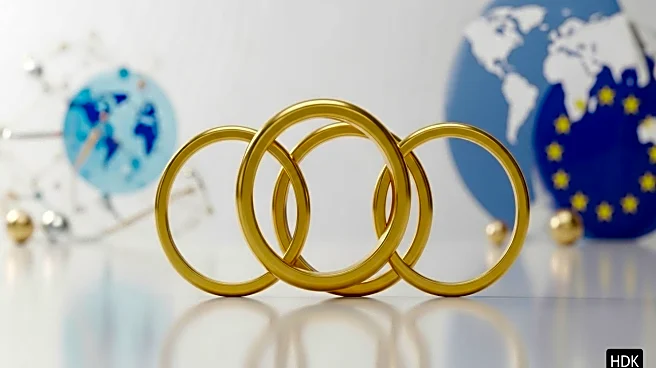What's Happening?
Germany, France, and Italy, the EU's major players within the G7, are advocating for the United States and Japan to join them in utilizing frozen Russian assets to support Ukraine. This initiative comes amid concerns from the European Central Bank about the potential impact on the euro's global credibility. During a virtual meeting of G7 finance ministers, the EU trio encouraged a unified approach to address Ukraine's financial needs, suggesting the use of Russian sovereign assets immobilized in their jurisdictions. However, the final communique from the meeting did not commit to joint action, instead listing asset utilization as one of several options under consideration. The EU's proposal involves deploying €140 billion of frozen Russian assets as a zero-interest reparations loan to Kyiv, a plan not yet fully endorsed by all EU member countries.
Why It's Important?
The proposal to use frozen Russian assets for Ukraine's aid is significant as it highlights the geopolitical and economic strategies being considered to support Ukraine amidst ongoing conflict. If successful, this move could set a precedent for international financial interventions in conflict zones, potentially affecting global economic policies and the stability of international currencies. The involvement of major economies like the U.S. and Japan is crucial, as their participation could lend credibility and weight to the initiative, potentially influencing other nations to follow suit. However, the hesitation from Japan and the U.S. reflects the complex considerations involved, including diplomatic relations and economic repercussions.
What's Next?
The next steps involve further discussions among G7 members to reach a consensus on the use of Russian assets. The EU is under pressure from the White House to utilize its stock of Russian central bank reserves, while Japan is expected to align its actions with Washington's decisions. The outcome of these deliberations could significantly impact the financial support available to Ukraine and the broader geopolitical landscape. Stakeholders will be closely monitoring the U.S. and Japan's decisions, as their actions could influence the EU's ability to implement its reparations loan plan.
Beyond the Headlines
The ethical and legal implications of seizing foreign assets for reparations are complex and could lead to long-term shifts in international law and financial governance. This approach raises questions about sovereignty, the legality of asset seizure, and the precedent it sets for future conflicts. Additionally, the potential impact on the euro's credibility underscores the delicate balance between political objectives and economic stability.











